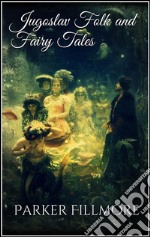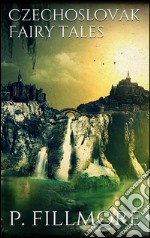Parker Fillmore eBooks
eBooks editi da Parker Fillmore di Formato Epub
Jugoslav folk and fairy tales. E-book. Formato EPUB Parker Fillmore - Parker Fillmore, 2015 -
In calling this A Book of Jugoslav Fairy Tales and Folk Tales I have used the word Jugoslav in its literal sense of Southern Slav. The Bulgars are just as truly Southern Slavs as the Serbs or Croats or any other of the Slav peoples now included within the state of Jugoslavia. Moreover in this case it would be particularly difficult to make the literary boundaries conform strictly to the political boundaries since much the same stories and folk tales are current among all these Slav peoples of the Balkan Peninsula. The special student taking the variants of the same story might discover special differences that would mark each variant as the product of some one locality. The work of such a student would have philological and ethnological value but not a very strong appeal to the general reader. My appeal is first of all to the general reader—to the child who loves fairy tales and to the adult who loves them. I hope they will both find these stories entertaining and amusing quite aside from any interest in their source. Yet these tales as presented do give the reader a true idea of the amazing vigor and the artistic inventiveness of the Jugoslav imagination, and also of the various influences, Oriental and Northern as well as Slavic, which have made that imagination what it is today. Here are gay picaresque tales of adventure—how they go on and on and on!—charming little stories of sentiment, a few folk tales of stark simplicity and grim humor, one story showing a superficial Turkish influence, and one spiritual allegory as deep and moving as anything in the Russian.
Czechoslovak fairy tales. E-book. Formato EPUB Parker Fillmore - Parker Fillmore, 2015 -
This rendering of some of the old Czechoslovak tales is not offered as a literal translation or a scholarly translation. I have retold the stories in a way that I hope will please American children. I have tried hard to keep the flavor of the originals but have taken the liberty of a short cut here and an elaboration there wherever these have seemed to me to make the English version clearer and more interesting. I have gone to Czech, Slovakian, and Moravian sources. All these stories appear in many versions in the different folklore collections made by such native writers as Erben, Nemcova, Dobsinsky, Rimavsky, Benes-Trebizsky, Kulda. They represent the folktale in all stages of its development from the bald narrative of The Bird with the Golden Gizzard which Kulda reports with phonographic exactness, to Nemcova’s more elaborate tale, Prince Bayaya, which is really a mosaic of two or three simpler stories. I have included Katcha and the Devil for the sake of its keen humor, which is particularly Czech in character; The Betrothal Gifts to show how a story common to other countries is made most charmingly local by giving it a local background; The Three Golden Hairs to contrast it with a famous German variant which it seems to me is much inferior to the Slavic version; and several fine stories of the prince gone off on adventures which in common with the folktales of all Europe show a strong Oriental influence.

